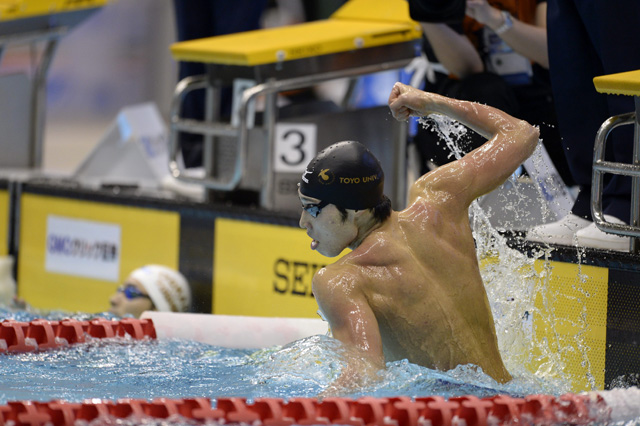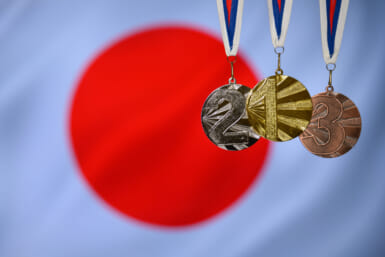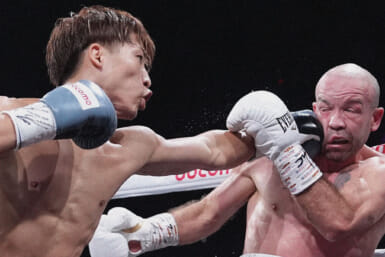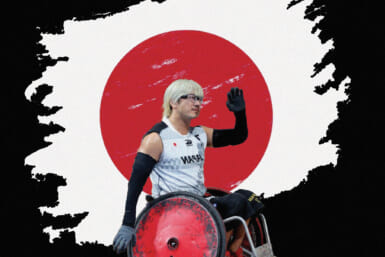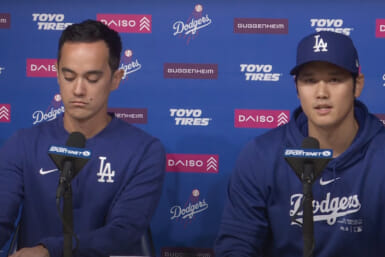Thanks to some controversial banners, rising international tensions and a competitor suspended for stealing a camera, Team Japan had quite an eventful time at the 2014 Asian Games in Incheon, Korea.
By Matthew Hernon
From a sporting perspective it went pretty much as expected: they finished on 47 gold medals, one fewer than four years ago. Their target of finishing in second place on the medals table was, in truth, unrealistic. South Korea won 32 more gold medals, while China, predictably, ran out as the overall winners with 151 golds.
The star performer, not only for Japan but of the entire Asian Games, was unquestionably Kosuke Hagino. The 20-year-old, who met with Weekender last year, picked up the Games MVP award after winning four gold medals—three of them in individual events—one silver, and two bronzes. While his victories in the 200m and 400m individual medley were expected, the 200m freestyle result was more of a surprise. With most of the focus on the rivalry between Sun Yang of China and South Korea’s Park Tae-hwan, Hagino stormed through the field to win the race in a Japanese record time of 1 minute, 45.23 seconds.
In the press conference that followed, he was bizarrely ordered to sit down when he got up to leave by a Chinese official. Chief technical researcher Lu Yifan then told the perplexed swimmer that “Japan might be leading now but we’ve only had two days and I can assure you it’s just a temporary position. Yes, Japan are a powerful team but we will catch up very soon.”
In the end, the Japanese men finished with eight gold medals to China’s seven, though overall it was the latter who topped the swimming medal tables, amassing 22 gold medals in total, ten more than Japan. Aside from Hagino, there were a number of other impressive performances in the pool by Japanese swimmers, most notably by Daiya Seto, Ryosuke Irie and Kanako Watanabe, who all won two gold medals apiece. The swimmer who won most headlines, however, was Naoya Tomita after he stole a camera belonging to a Korean photographer. He allegedly said to the police, “When I saw the camera, I just had to have it.” In the end he was forced to pay a fine of 1,000 won (around 100,000 yen), still much less than the actual price of the camera, reported to be around 8 million won—or approximately 821,000 yen.
Away from swimming, tennis fever continues to sweep the nation. Following Kei Nishikori’s run to the final at the US Open, Yoshihito Nishioka became the first Japanese tennis player for forty years to win a gold medal at the Asian Games. The fifth seed in Incheon, he cruised to a straight sets 6-2 6-2 win over number one seed Lu Yen-hsun of Vietnam in the final. He’s already been labeled “Nishikori II” in Japan, though the youngster, who turned 19 during the Games, admits he has a long way to go before he reaches anywhere near that level. Speaking after the final he said, “I am very happy to be compared to him but when he was my age, he was much higher ranked so I really have to fight harder to move up.”
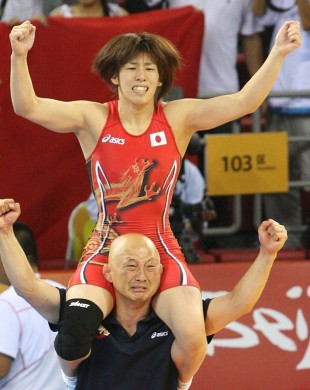
Freestyle Wrestler Saori Yoshida with her coach after taking the gold in Beijing, 2008 (Photo: Wikimedia Commons)
One of the biggest shocks of the Asian Games came in the men’s gymnastics team event, with Japan taking gold ahead of a China team defending their title for the tenth time. Japan’s victory was even more impressive given the fact that none of their Olympic silver medal winning team were in attendance. 18-year-old sensation and current world champion on the floor Kenzo Shirai was also absent so it was up to his older brother Shotaro Shirai to take centre stage. He outperformed China’s most decorated ever Olympian, Zou Kai, on the floor thanks to a superbly executed routine. Shirai’s teammate, Yuya Kamoto, continued to enhance his blossoming reputation, picking up three gold medals in total—in the team, parallel bars and individual all-around events—as well as a bronze on the floor.
In other team events, Japan won gold medals in the men’s rugby sevens, beating Hong Kong 24–12 in the final, and softball, where they thrashed Taiwan 6–0. There was disappointment for Nadeshiko Japan who lost 3–1 in the final to North Korea, while the men’s volleyball team were also defeated in their final by Iran. On the track there were victories for the men’s 4x400m relay team, the 50-km walker, Takayuki Tanii, and Keisuke Ushiro in the decathlon. As they were gunning for ten gold medals, it was a bit of a disappointing effort from the athletics team, who were missing poster boy Yoshihide Kiryu. The 100m runner pulled out of the Games due to a torn left hamstring.
Japan, unsurprisingly, topped the judo medals table, claiming six gold medals, two silvers, and five bronzes. They were also dominant in women’s freestyle wrestling, winning in three out of the four weights. Eri Tosaka and Rio Watari showed that they have bright futures in the sport, while legendary figure Saori Yoshida clinched her fourth consecutive gold medal at the Asian Games, a feat she will be looking to repeat at the 2016 Olympics.
Japan were completely dominant in the triathlon, coming first and second in both the men’s and women’s races. Ai Ueda finished well ahead of the field in the women’s event, while Yuichi Hosoda won at the Asian Games for the second time in succession. Competing in the third and forth legs of the mixed team event, both athletes then helped make it a clean sweep for Japan in the triathlon. Other gold medals came in karate (3), bowling (2), cycling (2), canoeing, fencing and rowing.
Asian Games, Kosuke Hagino, Saori Yoshida, Team Japan

